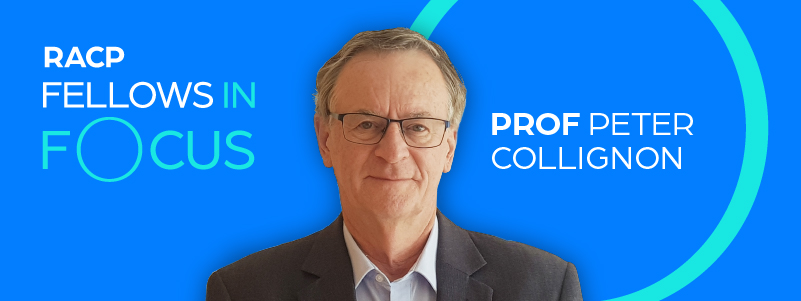RACP Fellows in Focus: Professor Peter Collignon
Date published:
19 Jul 2021

Professor Peter Collignon is an infectious diseases physician and microbiologist at the Canberra Hospital. He’s also a Professor at the Australian National University Medical School and is active in many research and public health advocacy issues dealing with different infections and associated risks.
Upon meeting Peter, his natural enthusiasm will rub off on you and he’ll be quick to express his interests in antibiotic resistance (especially in Staphylococcus), hospital-acquired infections (especially bloodstream and intravascular catheter infections) and resistance that develops through the use of antibiotics in animals. Expectedly, Peter is extensively involved in infection control projects looking at procedures and current practices in medicine and how these may be improved to decrease the risks for patients acquiring infections and for the community.
“What I like about infectious diseases, and still do, is that we cure things. I accept other people can too, but (relatively) infections are much more treatable, fixable and preventable. We've got much more scope to cure things and prevent them, than a lot of other specialties. COVID-19 is very much like that as well. It's an infection where we need to have extra precautions to prevent spread until, and likely after, our new vaccines are widely used globally. COVID-19 is really an example of the need for infection control and prevention in a major way. It is with infectious diseases and their prevention we have the ability to make a big impact.”
Peter has been, and continues to be, an active member of many national and international committees, including those of the Australian Commission on Safety and Quality in Health Care (ACSQHC). He has been appointed to many of the expert committees of the World Health Organization (WHO) on the issue of antibiotic resistance and the use of antibiotics in food animals. In June 2010, he was honoured with a Member of the Order of Australia for services to medicine in infectious diseases, microbiology and infection control.
When pressed about challenges he has faced during his career, Peter is quick to reply, “What you really worry about is that you don't actually know enough about these infections. You really worry that you'll give the wrong advice or offer the wrong opinion. That can cause a lot of harm either economically, socially, or letting infections go out of control. That's always been a concern. My own view is, if you say the wrong thing, you need to correct it as the data becomes available. So, hopefully I've done that.”
Peter’s influence within antibiotic resistance, both locally and internationally is a source of immense pride and satisfaction for him. His work has had an effect on trade, commerce and even how businesses operate. Despite an impressive career and the skills to support him, a career in infectious diseases wasn’t necessarily an easy path and Peter’s influences were important in allowing him to take stock of the things that were important to him, “my wife has had a lot of influence on my life and work. She's taught me to get a work-life balance. Too many of my colleagues work too many hours and I think it really is important to strike that balance in the medium to long-term.”
“I think I have the ability to be able to have meaningful discussions with most people, including people who may not share my viewpoint. I think appropriate conversation with all people is really important and I believe I can actually communicate in a language that most people can understand. I like questioning, I like finding answers.”
For trainees looking to specialise in infectious diseases, there are a few things that you can do to give yourself the very best opportunity to prosper. Peter emphasises that a passion and an interest in what you’re doing is paramount, but this should be closely married with being open and receptive to new opportunities, “you want to believe you can make a difference for people and your profession in that area.”
Looking to the future, Peter would like to see well-established infection control and prevention and would like to see that, “continue and improve”.
“I'm just one little cog in the whole thing,” reflects Peter who would like to see more and more controls on how antibiotics are used, both in people and in agriculture.
For future Fellows, Peter has some advice, “Get involved in things that you have a genuine passion in and find interesting. For me, that's the whole point of doing infectious diseases, rather than say, anaesthetics. You need to really believe that, 'this will sustain my interests for decades to come. I believe I can do it reasonably'. You're going to have to do a lot more learning and research as time goes on. You need to actually have people around you who've got different personalities and you need to listen to them. This way, you can actually truly work out the best way forward because you know, people look at the problem from different ways and you need to learn to appreciate that.”